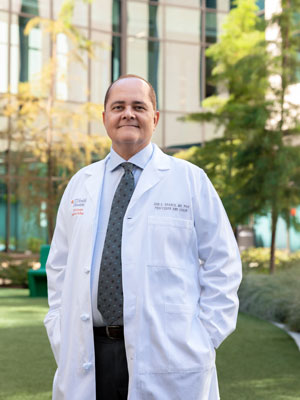Innovative stem cell trial for bipolar disorder gives patient hope


Ashley Hallock, 35, describes the day she joined a clinical trial studying stem cells for bipolar disorder as the most important day of her life.
“For me, it was a godsend,” she said.
Hallock had always struggled a little with depression, but in recent years, she sometimes had difficulty getting out of bed and finding joy in things, like publishing her photography book.
“It was as if my energy levels were depleted,” she said. “You view things from the outside and are unable to experience the positive emotions that come from things you’d normally enjoy.”
She was diagnosed with bipolar depression, but medications did not help. She saw an advertisement for a stem cell clinical trial for treatment-resistant bipolar depression at UTHealth Houston and signed up.
Bipolar disorder is characterized by shifts in mood, energy, and activity levels that can affect a person’s ability to carry out daily tasks, according to the National Institute of Mental Health. According to research published in 2023, 8 million Americans have bipolar disorder.
Hallock joined a double-blind, randomized, placebo-controlled trial that uses allogeneic mesenchymal stem cells, which are multipotent stem cells taken from an adult bone marrow donor. The mesenchymal stem cells are manufactured in the Judith R. Hoffberger Cellular Therapeutics Laboratory at UTHealth Houston, a state-of-the-art Food and Drug Administration-registered facility designed to comply with current good manufacturing practice.

“Since mesenchymal stem cells are known to counteract inflammation and promote neurogenesis, we are hopeful that they provide an innovative therapy for patients with treatment-resistant bipolar depression,” said Jair Soares, MD, PhD, vice president of Behavioral Sciences at UTHealth Houston and professor and chair in the Louis A. Faillace, MD, Department of Psychiatry and Behavioral Health Sciences. “We think the stem cells might lessen some of the inflammation in the brain that can lead to mood fluctuations.”
In previously published studies by researchers at UTHealth Houston, stem cells have shown a dampening effect on inflammation, which has been linked to bipolar disease. Inflammatory markers have also been associated with a decreased likelihood of response to treatment in people with bipolar disease.
“We have a very strong stem cell program at UTHealth Houston, and we paired up with stem cell researchers in pediatric neurosurgery and neurology who have been testing stem cells for other brain disorders,” said Soares, who is also the Pat R. Rutherford, Jr. Chair in Psychiatry, executive director of the John S. Dunn Behavioral Sciences Center at UTHealth Houston, and dean of the UTHealth Houston School of Behavioral Health Sciences. “This is an exciting time to be at the forefront of a field where we are able to test this new technology and see if it may offer some help for patients with bipolar disorder.”
Because the clinical trial is randomized and double-blind, Hallock doesn’t know whether she received the stem cells or a placebo. But she said she feels better since joining the study.
“My energy levels are much better. I’m able to keep my routine, and I started working out again,” she said. “I am participating in life. I feel balanced.”